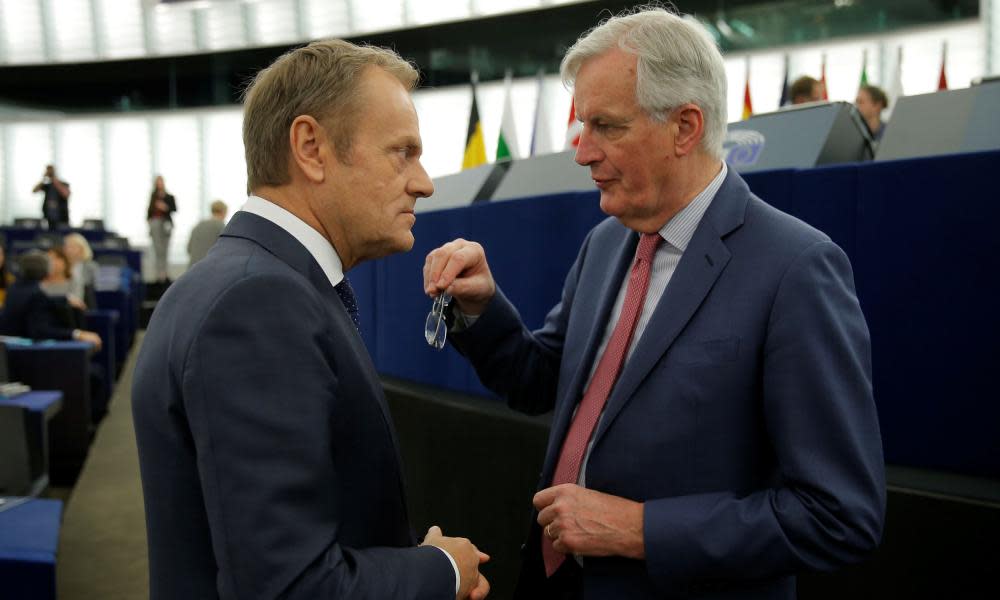EU signals it is likely to give UK a Brexit delay up to 31 January

The EU is set to accept the Boris Johnson’s reluctant request for a Brexit delay up to 31 January with the option of leaving earlier after Donald Tusk said he would recommend to heads of state and government that they sign it off without need for a summit.
“Following PM’s decision to pause the process of ratification of the Withdrawal Agreement, and in order to avoid a no-deal #Brexit, I will recommend the EU27 accept the UK request for an extension,” Tusk tweeted. “For this I will propose a written procedure.”
The European council president’s announcement followed MPs’ rejection of the prime minister’s timetable for passing the withdrawal agreement.
Before Tusk’s tweet, a spokeswoman for the European commission made a pointed reference to the new exit date sought in the extension request sent on Saturday. “The European commission takes note of tonight’s result and expects the UK government to inform us about the next steps,” the spokeswoman said. “Donald Tusk [president of the European council] is consulting leaders on the UK’s request for an extension until 31 January 2020.”
After MPs dealt their latest blow on Tuesday to the government’s hopes of leaving the EU by 31 October, Johnson said he would speak to Europe’s heads of state and government and pause the Brexit legislation until he had an answer with regard to an extension from Brussels.
Johnson said earlier in the day that he would seek a general election if the EU gave a three-month extension. EU sources had suggested that Brussels would seek to avoid being dragged into a domestic row by offering a flexible extension that would allow the UK to leave upon ratification of the deal.
However, an EU source said that if the bloc was to think again on the length of the extension then Johnson would need to make a second formal request for a shorter delay, but that it did not seem legally possible under the Benn act.
Tusk’s intention to sign off on an extension without recourse to a summit of leaders suggests that the EU is content to simply accept the UK government’s proposed extension up to February with the option for an earlier departure if ratification is achieved earlier.
During a debate in the European parliament on Tuesday, Tusk confirmed the EU would grant a Brexit delay beyond 31 October, with the terms of the extension of UK membership depending on developments in Westminster.
He told MEPs in Strasbourg the EU would respond to the government’s extension request in “the coming days”.
Tusk said: “The situation is quite complex following events over the weekend in the UK and the British request for an extension of the article 50 process. I’m consulting the leaders on how to react and will decide in the coming days. It’s obvious that the result of these consultations will very much depend on what the British parliament decides or doesn’t decide.
“We should be ready for every scenario but one thing must be clear, as I said to Prime Minister Johnson on Saturday, a no-deal Brexit will never be our decision.”
After several MEPs backed a further delay during the debate, Tusk reiterated his backing for an extension. “Thank you for your responsible position on Brexit and the extension,” he said. “After what I have heard today in this chamber, I have no doubt that we should treat the British request for an extension in all seriousness.”
Leo Varadkar expressed the EU’s relief that the Brexit deal had received MPs’ backing in a vote on the second reading.
The Irish taoiseach said: “It’s welcome that the House of Commons voted by a clear majority in favour of legislation needed to enact the withdrawal agreement. We will now await further developments from London and Brussels about next steps including the timetable for the legislation and the need for an extension.”
An extra hurdle to the Johnson’s hopes of leaving by 31 October appeared to be put in the way by Guy Verhofstadt, the coordinator of the European parliament’s Brexit steering group.
He told MEPs the chamber should withhold its approval for the deal until further assurances were received over the UK government’s treatment of EU citizens, including 200,000 people who are regarded as being vulnerable.
“We do not want EU citizens involved in another Windrush scandal in Britain,” the former prime minister of Belgium said. “That cannot happen.”
In comments that will antagonise the Democratic Unionist party, which is opposing the revised deal, Tusk said the agreement struck had been possible due to Johnson’s acceptance of a border being drawn in the Irish Sea between Northern Ireland and the rest of the UK.
“[The deal] is based on the deal that we agreed with the previous government,” Tusk said. “The changes concern the protocol on Ireland and Northern Ireland formerly known as the backstop.
“Prime Minister Johnson’s acceptance to have customs checks at the points of entry into Northern Ireland will allow us to avoid border checks between Ireland and Northern Ireland and will ensure the integrity of the single market.”

 Yahoo News
Yahoo News 
